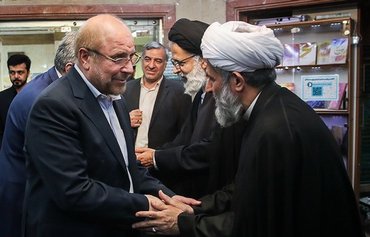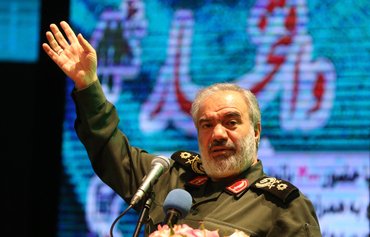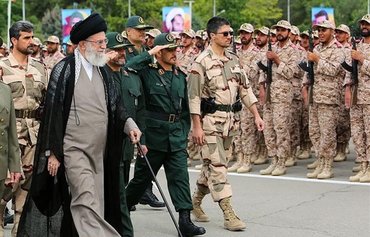At its inception, the Islamic Revolutionary Guard Corps (IRGC) was an ideologically oriented force, tasked with bringing the regime of Rouhollah Khomeini to power and "exporting the revolution".
In the roughly four decades since, analysts say, the IRGC has increased its emphasis on ideological training, giving it equal weight with military training and rewarding and promoting its most radical elements.
As the very name of the force -- which does not include "Iran" -- suggests, the IRGC's military capabilities are not intended for any true domestic purpose other than cracking down on dissent.
This is because the IRGC was mainly established to implement regional expansion policies and carry out the mission of "exporting the revolution" -- the goal of the Islamic Republic's founder, Khomeini.
![Iran's leader Ali Khamenei is seen here in 2019 with then IRGC-QF commander Qassem Soleimani, a few months before Soleimani was killed in Baghdad. [Khamenei.ir]](/cnmi_am/images/2022/05/10/35296-Iran-Khamenei-soleimani-600_384.jpg)
Iran's leader Ali Khamenei is seen here in 2019 with then IRGC-QF commander Qassem Soleimani, a few months before Soleimani was killed in Baghdad. [Khamenei.ir]
![Majles (parliament) speaker Mohammad-Bagher Ghalibaf is seen here in 2020. [IRNA]](/cnmi_am/images/2022/05/10/35298-Iran-Majles-Ghalibaf-600_384.jpg)
Majles (parliament) speaker Mohammad-Bagher Ghalibaf is seen here in 2020. [IRNA]
Its recruits and trainees are indoctrinated and rewarded with promotions depending on how loyal they are to the core beliefs of the establishment and how committed they are to its regional activities.
In a May 3 report, the Middle East Institute (MEI) said the IRGC's indoctrination efforts have increased as of late, and noted that the investment in increasing indoctrination has paid dividends for the regime.
Ideological commitment is rewarded with additional pay and leads to promotions and a rise in the rankings within the IRGC, the report said.
It also noted that the third and fourth generations of IRGC elements (those recruited between 2000 and 2020) are among the most ideologically radical.
Molding recruits
The IRGC singles out for recruitment individuals who are ideologically inclined, and therefore susceptible to indoctrination, or those in need of financial support, and molds them into the people it desires them to be, analysts say.
Members of this institution, now a key player in Iranian politics and the economy, are rewarded for their extremism and commitment to the Guardianship of the Jurist (Wilayat al-Faqih) doctrine.
This calls for allegiance to Iranian leader Ali Khamenei, who holds the ultimate power in Iran and staunchly supports the IRGC.
Guardianship of the Jurist is a Shia theological proposition that justifies Iran's dictatorial system of rule and export of "revolution" across the region. It is largely dismissed in the broader Shia community as a theological anomaly.
Regional interference is at its core, through the export of the revolution.
Khamenei maintains close ties with the IRGC and influences all its decisions, strategies and actions.
"Khamenei and the regime are entirely beholden to the IRGC," a former Iranian naval analyst who asked to remain anonymous told Al-Mashareq.
The IRGC claims an increasingly large share of the country's budget, and dominates major sectors of the Iranian economy.
It has controlling interests in the oil, telecommunications, transportation, ports and shipping, customs, export and import industries as well as in industrial and agricultural sectors.
Artesh marginalised, overlooked
The Islamic Republic has prioritised the IRGC over the Artesh, Iran's conventional armed forces, said the former Iranian naval analyst, noting that "the IRGC values ideology more than expertise".
"The force was formed in the early revolutionary era [early 1980s] to circumvent the professionally trained military, which revolutionaries saw as disloyal and possibly sympathetic to the West," he said.
Both in terms of budget and defence, the Artesh has been marginalised since the end of the Iran-Iraq war. And it is not trusted by the rival IRGC or by Khamenei.
The IRGC has long dominated the Artesh logistics and preparations division, known as ETKA.
Yet in a file leaked in February, a senior IRGC official notes that "we [IRGC] should do something about ETKA, since Artesh folks have recently tried to wiggle their way in".
Despite the more practical training Artesh forces receive, they have only a marginal role in the country's overall military sphere.
"Khamenei, who is the commander-in-chief, is well aware of the IRGC's shortcomings but insists on prioritising it over the Artesh," said Iran-based military expert and Artesh veteran Babak Aslaninia.
"One example of the shortcomings is the downing of Ukraine International Airlines Flight 752. Instead of defending the country's sovereignty, they killed our own civilians, and this is just one instance."
"Khamenei and the IRGC are more focused on Islamic fundamentalism, the Quds Force [IRGC-QF] and its regional destabilising actions than on defending the country," he said.
"That is because the public and national sovereignty have never been important to them," Aslaninia noted.
Rewarding the most extreme
As the IRGC has increasingly infiltrated Iran's political scene, the number of its members who have been appointed as regional ambassadors, mayors, managers and middle managers in the government also has risen.
Iranian President Ebrahim Raisi has stacked his cabinet with hardliners, many of whom are former IRGC officials, to an unprecedented degree.
Among them is former IRGC official Mohammad-Bagher Ghalibaf, who was close to the late IRGC-QF commander Qassem Soleimani.
Accused of embezzling large amounts of money during his mayoral tenure in Tehran, Ghalibaf escaped unscathed in a trial that saw others convicted, and went on to become Majles speaker in May 2020.
In April, he made headlines again for his family's lavish trip to Turkey. Family members brought back 20 large suitcases of items they had purchased, sparking public uproar at a time when many in Iran are suffering greatly.
This is while regime officials, including Khamenei, constantly describe how simply they live and how little they have, despite all evidence to the contrary.
"If you look at the last 40 years, I do not think you will find an example of a senior IRGC officer being held responsible for any misconduct in Iran or abroad," the naval analyst said.
"At most, they are moved around or given new titles or new jobs."
This process has fuelled resentment inside Iran -- which is facing an acute economic crisis as the IRGC fills its own coffers and bankrolls its regional affiliates -- and sparked popular protests that the IRGC has helped to suppress.

![IRGC recruits are seen here in 2019 on their graduation day in Tehran. [Khamenei.ir]](/cnmi_am/images/2022/05/10/35297-Iran-IRGC-graduates-600_384.jpg)






